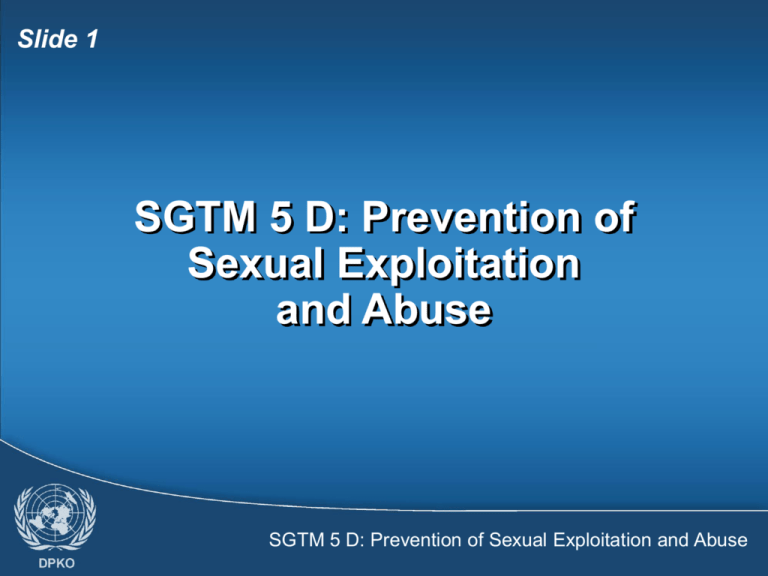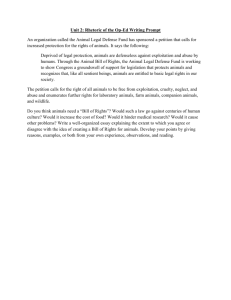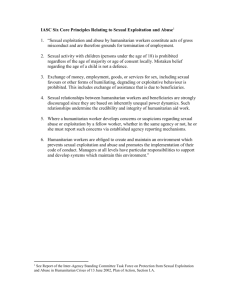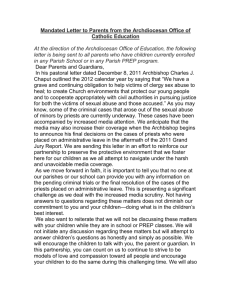
Slide 1
SGTM 5 D: Prevention of
Sexual Exploitation
and Abuse
SGTM 5 D: Prevention of Sexual Exploitation and Abuse
Slide 2
Learning outcomes
Describe what constitutes sexual
exploitation and abuse
Outline the UN policies on standards of
conduct concerning sexual exploitation and
abuse
Describe what is prohibited behaviour
Explain the impact of misconduct on
peacekeeping operations and host population
SGTM 5 D: Prevention of Sexual Exploitation and Abuse
Slide 3
Learning outcomes
List the consequences for individuals and the
mission if mission personnel are directly or
indirectly involved engaging in this form of
misconduct
List the main responsibilities of personnel and
managers/staff officers to prevent and respond to
sexual exploitation and abuse
Identify who is the peacekeeping operation’s
Focal Point on sexual exploitation and abuse
SGTM 5 D: Prevention of Sexual Exploitation and Abuse
Slide 4
Pre-workshop test
10 minutes to complete
Test to be re-taken at the
end of session
Upon completion, please put
it away for now
SGTM 5 D: Prevention of Sexual Exploitation and Abuse
Slide 5
SGTM 5 D: Prevention of Sexual Exploitation and Abuse
Slide 6
What is sexual exploitation and abuse?
Sexual exploitation
Any actual or attempted abuse of a
position of vulnerability, differential power
or trust for sexual purposes, including but
not limited to, profiting monetarily,
socially or politically from the sexual
exploitation of another.
(ST/SGB/2003/13)
SGTM 5 D: Prevention of Sexual Exploitation and Abuse
Slide 7
What is sexual exploitation and abuse?
Sexual abuse
Actual or threatened physical intrusion
of a sexual nature, whether by force or
under unequal or coercive conditions.
(ST/SGB/2003/13)
SGTM 5 D: Prevention of Sexual Exploitation and Abuse
Slide 8
Standards of conduct
Sexual activity with children (persons
under the age of 18) is prohibited
Exchange of money, employment,
goods, assistance or services for sex,
e.g. sex with prostitutes, is prohibited
Sexual relationships with beneficiaries
of assistance are strongly discouraged
SGTM 5 D: Prevention of Sexual Exploitation and Abuse
Secretary-General’s Bulletin
Slide 9
Consider the “test” for sexual
exploitation:
Actual or attempted abuse of:
Position of vulnerability
Differential power
Trust
for sexual purposes
SGTM 5 D: Prevention of Sexual Exploitation and Abuse
Slide 10
What is human trafficking?
Trafficking is the
recruitment, transportation,
transfer, harbouring or
receipt of persons, by the
threat or use of force or
other means, for the
purpose of exploitation.
(Art 3 UN Trafficking Protocol)
SGTM 5 D: Prevention of Sexual Exploitation and Abuse
Slide 11
We create
the demand
We are part of
the problem
SGTM 5 D: Prevention of Sexual Exploitation and Abuse
Slide 12
Special vulnerability in conflicts
Women and children most vulnerable
Sexual violence as strategy in armed conflict
Increase of organized crime
Increased poverty
Loss of social services
Loss of access to rights; fear of reporting and
retaliation
Unequal power relationships that can be exploited
SGTM 5 D: Prevention of Sexual Exploitation and Abuse
Slide 13
Impact on mission mandate
Violates victim’s human rights
Misconduct contrary to UN Principles
Violates integrity and impartiality
Reduces credibility and image of UN
Threatens security
Undermines rule of law and fosters crime
SGTM 5 D: Prevention of Sexual Exploitation and Abuse
Slide 14
Consequences of sexual misconduct
Sexual exploitation and abuse is serious
misconduct and subject to disciplinary action
Possible summary dismissal, termination of
UN contract and no further UN service
For criminal offences, all except military
members of national contingents can be
tried in the host country
Military members of national contingents
subject to their own military justice,
including court martial
SGTM 5 D: Prevention of Sexual Exploitation and Abuse
Slide 15
Your responsibilities
Be informed
Be a role model
Report suspicions, rumours and
allegations
Cooperate fully with
investigations
Inform local population on
reporting mechanisms
SGTM 5 D: Prevention of Sexual Exploitation and Abuse
Slide 16
What are the duties of managers and officers
to prevent and respond to sexual exploitation
and abuse?
Be a role model
Create an environment that discourages sexual
exploitation and abuse
Provide information to and raise awareness of
PKO personnel
Provide information to local populations on the
UN standards of conduct and complaints
mechanisms available
SGTM 5 D: Prevention of Sexual Exploitation and Abuse
Slide 17
How do I report a rumour of sexual exploitation?
Chain of Command
Mission Focal Point (or other agency
focal point)
Personnel Conduct Officer
The Office of Internal Oversight
Services (OIOS)
SGTM 5 D: Prevention of Sexual Exploitation and Abuse
Slide 18
In groups
Examine the case study you have
been given:
Identify and discuss the issues around
sexual exploitation and abuse
Which of the identified acts constitute
misconduct and why?
SGTM 5 D: Prevention of Sexual Exploitation and Abuse
Slide 19
Key messages
Remember
Sex with anyone under 18 years of age is
prohibited
Exchanging money, goods, food or
employment for sex, e.g. prostitution, is
prohibited
Prevent sexual exploitation and abuse
Report any suspicions, rumours or allegations
Set an example
SGTM 5 D: Prevention of Sexual Exploitation and Abuse






